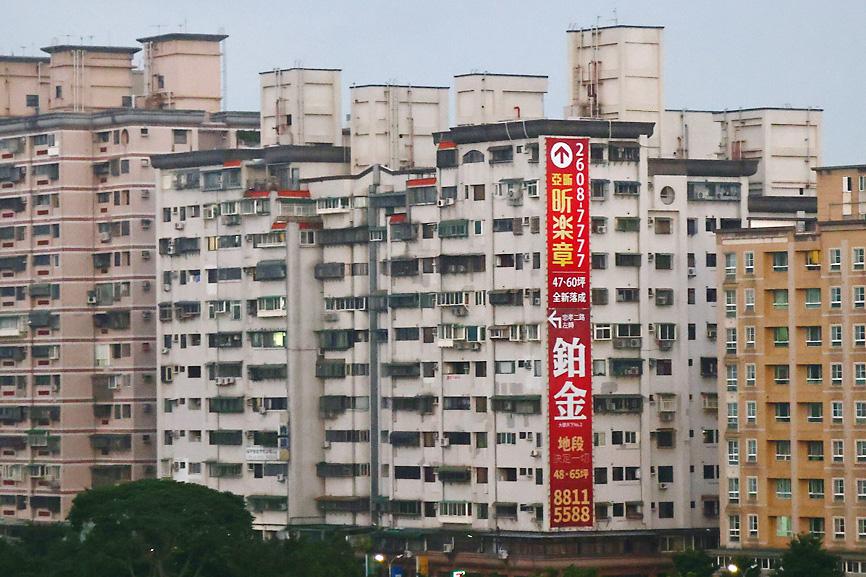The nation’s housing price index in the second quarter of this year rose 0.67 percent from three months earlier to 105.9 as home prices picked up across Taiwan on the back of real demand and asset allocation needs, Ministry of the Interior data showed.
Tainan reported the biggest advance at 1.31 percent, followed by Taichung’s 1.19 percent, Taoyuan’s 0.68 percent and Kaohsiung’s 0.38 percent gain, the data showed.
Housing prices inched up 0.2 percent in Taipei and 0.09 percent in New Taipei City.

Photo: Ann Wang, Reuters
The price hikes came even though Taiwan’s GDP contracted 0.58 percent during the April-to-June period when the COVID-19 pandemic inhibited consumer spending, but failed to weaken interest in real estate.
Deputy Minister of the Interior Hua Ching-chun (花敬群) said the price increase had to do with improving infrastructure in central and southern Taiwan, which explains why the uptick was less evident in the greater Taipei area.
Compared with a year earlier, the housing price index grew at an average of 1.38 percent, the data showed.
Meanwhile, housing affordability improved as the average mortgage burden fell 0.66 percent from the previous quarter and 1.42 percent from a year earlier to 34.64 percent, the ministry said.
Lower borrowing costs accounted for lower mortgage burdens in almost all parts of Taiwan except Taipei, it said.
The central bank in March cut the rediscount rate to a record low of 1.125 percent in the hope of easing financial burden on households amid the pandemic.
State-run and private lenders took the cue and reduced their interest rates.
Mortgage burden declined 2.58 percent in Taichung, fell 1.9 percent in New Taipei City and shrank 0.92 percent in Taoyuan, the ministry said.
Tainan and Kaohsiung saw mortgage payments softening 0.63 percent and 0.75 percent respectively, it said.
Taipei bucked the decline with a 0.51 percent gain to 57.57 percent, it said.

UNCERTAINTY: Innolux activated a stringent supply chain management mechanism, as it did during the COVID-19 pandemic, to ensure optimal inventory levels for customers Flat-panel display makers AUO Corp (友達) and Innolux Corp (群創) yesterday said that about 12 to 20 percent of their display business is at risk of potential US tariffs and that they would relocate production or shipment destinations to mitigate the levies’ effects. US tariffs would have a direct impact of US$200 million on AUO’s revenue, company chairman Paul Peng (彭雙浪) told reporters on the sidelines of the Touch Taiwan trade show in Taipei yesterday. That would make up about 12 percent of the company’s overall revenue. To cope with the tariff uncertainty, AUO plans to allocate its production to manufacturing facilities in

Taiwan will prioritize the development of silicon photonics by taking advantage of its strength in the semiconductor industry to build another shield to protect the local economy, National Development Council (NDC) Minister Paul Liu (劉鏡清) said yesterday. Speaking at a meeting of the legislature’s Economics Committee, Liu said Taiwan already has the artificial intelligence (AI) industry as a shield, after the semiconductor industry, to safeguard the country, and is looking at new unique fields to build more economic shields. While Taiwan will further strengthen its existing shields, over the longer term, the country is determined to focus on such potential segments as

TAKING STOCK: A Taiwanese cookware firm in Vietnam urged customers to assess inventory or place orders early so shipments can reach the US while tariffs are paused Taiwanese businesses in Vietnam are exploring alternatives after the White House imposed a 46 percent import duty on Vietnamese goods, following US President Donald Trump’s announcement of “reciprocal” tariffs on the US’ trading partners. Lo Shih-liang (羅世良), chairman of Brico Industry Co (裕茂工業), a Taiwanese company that manufactures cast iron cookware and stove components in Vietnam, said that more than 40 percent of his business was tied to the US market, describing the constant US policy shifts as an emotional roller coaster. “I work during the day and stay up all night watching the news. I’ve been following US news until 3am

COLLABORATION: Given Taiwan’s key position in global supply chains, the US firm is discussing strategies with local partners and clients to deal with global uncertainties Advanced Micro Devices Inc (AMD) yesterday said it is meeting with local ecosystem partners, including Taiwan Semiconductor Manufacturing Co (TSMC, 台積電), to discuss strategies, including long-term manufacturing, to navigate uncertainties such as US tariffs, as Taiwan occupies an important position in global supply chains. AMD chief executive officer Lisa Su (蘇姿丰) told reporters that Taiwan is an important part of the chip designer’s ecosystem and she is discussing with partners and customers in Taiwan to forge strong collaborations on different areas during this critical period. AMD has just become the first artificial-intelligence (AI) server chip customer of TSMC to utilize its advanced